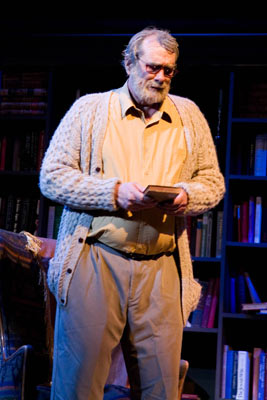Victory, presented by Santa Barbara Theatre.
At the Lobero Theatre, Thursday, May 8.

A world-weary widowed educator might seem an unlikely dramatic hero, but the archetype of the passionless, past-his-prime professor has kept popping up the past few weeks. Richard Jenkins brings minimalist precision to his moving portrait of an emotionally guarded economist in the fine new film The Visitor. And last weekend, Santa Barbara Theatre brought the brilliant Morlan Higgins to the Lobero to play Lionel Benson, the South African academic at the center of Athol Fugard’s despair-filled drama Victory.
Like Jenkins’s character, Higgins’s retired teacher finds his life upended when he encounters a pair of unexpected houseguests. But while The Visitor finds transcendence in fleeting moments of connection, Fugard’s semi-autobiographical play is far grimmer, if equally compelling. The visitors to Lionel’s home are burglars: a would-be tough guy whose idea of ambition is running off to Cape Town to join a street gang and a needy teenage girl who is largely lost in an alcoholic haze. As Lionel quickly realizes, to his disbelief and horror, she is the daughter of his late housekeeper-a girl he watched grow up in his living room. He feels deeply betrayed, but that feeling goes both ways; as she tells her story, Lionel comes to understand he was not there when she needed him most.
Fugard’s words, Higgins’s performance, and Stephen Sachs’s direction proved a stunning combination in Exits & Entrances three years ago, and this, their most recent collaboration that had its U.S. debut at L.A.’s Fountain Theatre, is no less impressive. Fugard’s 70-minute drama could be more subtle in describing the failure of his home country to live out its promise; at times one wishes he had given the characters room to reveal additional shadings. But if he had, perhaps the work wouldn’t have the taut feel of Greek tragedy, a quality Sachs and his cast capture quite compellingly.
Higgins brings a palpable heaviness to Lionel that lifts only for the few minutes the character recalls his teaching days. He conveys the ache and bewilderment of a flawed but well-meaning man who has given up not only on his own life, but his society. As the two burglars-members of the black underclass that still amounts to a separate and unequal society years after the end of apartheid-Lovensky Jean-Baptiste is a fiery mix of anger, entitlement, and testosterone, while Tinashe Kajese gives a moving portrayal of lost innocence.



